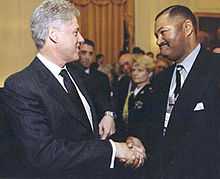Charles W. Sanders
Charles W. Sanders (born May 12, 1947) is an insurance agent, tour bus driver, and retired Ohio auto worker who has run as a Democrat for the U.S. House of Representatives four times in Ohio's heavily Republican Second Congressional District from 1998 to 2004, losing four times to incumbent Congressman Robert J. Portman. When Portman resigned his seat, Sanders was a candidate for the Democratic nomination in the Second, but lost to Paul Hackett. He was a candidate for the Democratic nomination in the Third District on the May 2, 2006, primary, seeking to challenge Republican incumbent Mike Turner.
He was born in Harveysburg, Ohio, the son of William T. and Ida Francis Sanders. He attended the public schools in Harveysburg and graduated from Clinton-Massie High School. He received a Bachelor of Science degree in industrial and labor relations from Wilmington College in Wilmington, Ohio in 1978.
Sanders served in the U.S. Army from 1964 to 1967. After leaving the army he worked for General Motors in Dayton, Ohio from 1967 until his retirement in 1998. Sanders was active in Democratic politics in Warren County, Ohio, serving as county party treasurer from 1976 to 1980. He was a member of Rotary and other community organizations.

Sanders was recalled by the voters in November 2000 because of his claims the Waynesville police were engaged in racial profiling (Sanders is African American). Some citizens were also concerned he was spending too much time on his Congressional races. The vote was 59 percent for his recall, 41 percent against. In 2002 and 2004, he again ran against Portman despite no longer living in the Second District. In four runs against Portman, Sanders never got better than 28 per cent of the vote.
In 2005, Portman resigned his seat to become United States Trade Representative. The Democratic party tried to recruit a well-known candidate to run but all bowed out. Sanders faced four opponents in the June 14 primary election: Paul Hackett, 43, a lawyer in Indian Hill, Hamilton County; Arthur Stanley Katz, 82, a lawyer from Mason, Warren County, running as a write-in candidate; James John Parker, a health care administrator from Waverly, Pike County; Jeff Sinnard, 42, a civil engineer from Anderson Township, Hamilton County; and Victoria Wells Wulsin, 51, a doctor from Indian Hill, Hamilton County.
Only Hackett had ever run for office before and he received the endorsements of the county parties in Brown, Clermont, Hamilton, and Pike Counties. Sanders was unconcerned, telling The Cincinnati Enquirer "People out there know me. I may not have the money or the organization, but no one in this race will work harder." Tim Burke, Hamilton County Democratic Party chairman, said the endorsement "doesn't mean we don't appreciate what other individuals have done for the party by being our candidate in the past or by running in this race. It just means we're being realistic about what, under the best of circumstances, is going to be a very, very difficult race." Burke had previously said "The blunt reality is that Charles Sanders can't win the 2nd District seat" and "God bless Charles Sanders for taking on Rob Portman when nobody else would, but we need a candidate who can take it to another level. We need somebody with an eye-popping background who will get the media's attention."
2004 Democratic Party primary election results for the Second District:
| Candidate | Votes | Percentage |
|---|---|---|
| Charles W. Sanders | 20,658 | 65% |
| Mark A. Crummie | 10,943 | 35% |
See also
- Election Results, U.S. Representative from Ohio, 2nd District
- Ohio Second Congressional District Election, 2005
External links
|